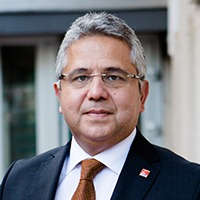Authors Columns of the Day Sport Guest Life All Authors
The story behind Turkiye's olympic gold medal drought!
For the first time in 40 years, Turkiye has returned from the Olympic Games without a gold medal, prompting a deep inquiry into the causes of this decline in sports. The criticism is mainly directed at Youth and Sports Minister Osman Aşkın Bak and the heads of the underperforming federations. Minister Bak shifted the blame onto the federations, stating, "Federations that fail to use the resources provided to them effectively will be held accountable." But what is the real issue? After the tenures of sports ministers Fikret Ünlü and Erdoğan Toprak, Turkish sports entered a spiral of politicization under the AKP government. In the early years of AKP rule, bureaucrats managed to control the politicization of sports administration. However, the "let's appoint someone from our circle" mentality that spread to over 60 sports federations laid the groundwork for the downfall of Turkish sports. During this period, budgets were squandered, and merely building facilities did not lead to success.
YERLIKAYA IN THE CROSSHAIRS
In recent years, sports ministers have frequently changed, but Deputy Sports Minister Hamza Yerlikaya has remained a constant figure. Following the disappointment at the Paris 2024 Olympics, Yerlikaya has become the target of harsh criticism. It was previously claimed that after the Tokyo Olympics, Yerlikaya interfered in the elections of various sports branches, including judo, leading to a split within the "state intellect" of the sports organization. It has also been reported that Yerlikaya distanced himself from certain key branches when allocating federation budgets before the Olympics. Minister Osman Aşkın Bak has been accused of neglecting the Olympic team due to his involvement in the Turkish Football Federation (TFF) elections.
UNQUALIFIED STAFF
The political maneuvers and the rise of "unqualified" staff have played a significant role in the debacle at Paris 2024. In many federations and even among coaches and technical teams, the lack of sufficient knowledge and experience has been a major factor in the failure.
LACK OF PERFORMANCE CENTERS
While countries like the U.S., China, Japan, Australia, the U.K., and France, which integrate sports with science, dominated the top spots in Paris, the AKP government opened over 100 physical education schools but consistently placed high performance in the background. At universities, passive participation (recreation) took precedence over performance-enhancing sciences, and elite athletes could only prepare for the Olympics thanks to clubs like Istanbul Metropolitan Municipality Sports, ASKİ, Fenerbahçe, ENKA, Galatasaray, and Balıkesir Metropolitan Municipality. Due to austerity measures, Turkish athletes were not sent to training camps abroad. Connections with universities in the U.S. and the U.K. were severed, and the TOHMs (Turkiye Olympic Preparation Centers), launched with great expectations, were downgraded to ordinary camp centers over the past year.
SIGNS OF ELECTION INFLUENCE
By law, nearly 60 sports federations will hold elections after the Olympics. Following the opposition's victory in local elections, the opposition's vote share in some federations is around 25%, with the majority ranging between 18-19%. The sports organization, known as the "state intellect," is divided. Deputy Minister Hamza Yerlikaya and bureaucrats are expected to back different candidates. Minister Osman Aşkın Bak's statement blaming the federations after the Paris defeat is seen as a signal for changes in branches like basketball, judo, athletics, and weightlifting, which failed to secure Olympic qualification. Changes are certain, especially in branches where certain individuals have held the same position for years.
THE GRADUAL DISAPPOINTMENT IN PARIS
In some branches, our athletes are not working with the right academics. This situation affects everything from training to motivation. Models that should be implemented by following global examples are either neglected for financial reasons or dismissed with an "We can do it ourselves" attitude. In some branches, efforts are made solely by the athletes or their families. In the psychological aspect, we quickly celebrate athletes who achieve short-term success, declaring them superheroes. However, when failure occurs, support is withdrawn just as quickly. Despite having a young population in a country of 85 million, we fail to instill the concept of sports and Olympic consciousness in the public. We perceive sports through the lens of football, colors, and teams. We cannot move beyond the idea that "participation is what matters." Many countries with fewer athletes and more limited resources fight intensely for gold medals and win them, while we struggle to reach the top of the podium.

